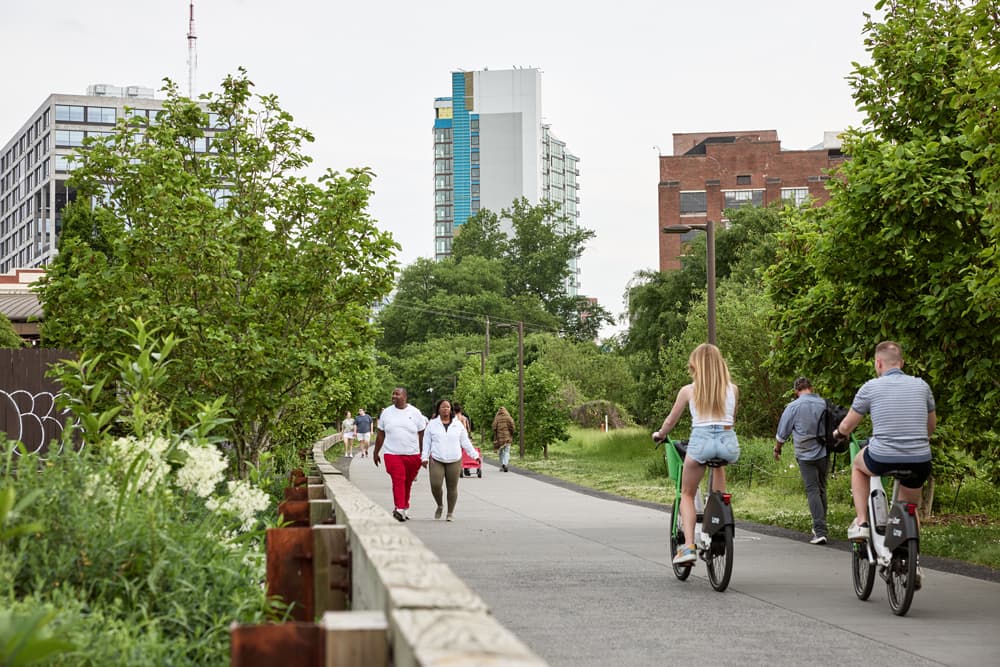Atlanta Beltline, Inc. Passes $153.6 Million Budget, Largest in History, as Program Marks Significant Milestones for Construction and Community Programming Along 22-Mile Corridor
Budget includes largest investments to date in affordable housing and construction ATLANTA (June 16, 2023) – Atlanta Beltline, Inc. has passed a $153
- Business News
- Parks & Trails
- Atlanta Beltline‚ Inc.

Budget includes largest investments to date in affordable housing and construction

The Atlanta Beltline Eastside Trail. Photo by Erin Sintos.
ATLANTA (June 16, 2023) – Atlanta Beltline, Inc. has passed a $153.6 million budget for fiscal year 2024, a significant milestone that marks the program’s most active year for trail construction, land acquisition and advancements in affordable housing initiatives.
The Beltline’s Tax Allocation District (TAD) funding provides up to 40 percent of the budget, while Atlanta Beltline Partnership raised an unprecedented $46.6 million from philanthropic sources to secure the final dollars needed to cinch completion of the 22-mile, multi-use trail loop by the end of 2030.
Budget increases include the most funding to date for trail design and construction and affordable housing. Of the $61.4 million in TAD funding included in the fiscal 2024 budget, $15.5 million has been earmarked for affordable housing initiatives. At 25.3 percent, affordable housing represents the largest portion of TAD funding. Overall, $57 million of the new budget will go to trail design, parks, and construction. By the end of 2024, 80 percent of the mainline Beltline trail loop is expected to be complete or under construction.
Real estate investment makes up the largest year-over-year budget line-item increase, including more funding than ever for land acquisition to secure sites for affordable housing and commercial affordability within the TAD. To date, the Beltline has invested $43 million in 72 acres across six sites that make way for affordable options for residents and businesses.
“This year we turn a significant corner in the history of the Atlanta Beltline as we complete our most active year to date for construction, affordable housing initiatives, land acquisition and other elements of our program that promote thoughtful, intentional development of this unprecedented project,” said Atlanta Beltline, Inc. President and CEO Clyde Higgs. “This budget includes the significant funding needed to advance the Beltline toward completion by 2030 and secures our commitment to equitable development along the 22-mile path that connects our communities and city.”
Thanks to the 2021 passage of the Beltline’s Special Service District (SSD), a significant amount of TAD funding can be allocated towards affordability efforts. The Beltline TAD is funded through property taxes in partnership with Atlanta Public Schools (APS), City of Atlanta and Fulton County. Funding for the SSD is supported by commercial and multi-family property owners.
Through the issuance of bonds, SSD funding directly supports the design and build-out of the multi-use trail, complementing TAD funding, and unlocking additional philanthropic contributions, grants, and other funding sources needed to complete the loop. The SSD will also continue to complement the TAD by funding additional commitments of $12 million to economic development and $45 million to affordable housing initiatives.
Recent projects funded in support of housing and commercial affordability include acquisition of a 6.3-acre site at 350 Chappell Road in partnership with City of Refuge, the 31-acre site at 425 Chappell Road currently in master planning, The Avenue at Oakland City, the transformational 20-acre Murphy Crossing development and the 2.68-acre Garson Drive project in southern Buckhead.
The Beltline’s goal is to assist in the creation or preservation of 5,600 affordable housing units within the Beltline TAD by the end of 2030. To date, the Beltline is 56% of the way toward this goal, having assisted in the creation or preservation of more than 3,100 affordable places to live.
The Beltline’s vision for economic inclusion consists of five pillars: small business support, commercial revitalization, workforce development, commercial affordability, and digital inclusion and innovation. Funding supports programs and activities that align with these pillars and allows the Beltline to spur inclusive economic growth for small, local Minority Business Enterprises around the corridor, contributing to wealth building for communities along the Beltline’s Equity Priority Areas, and driving further job creation through their growth and development.
This year’s budget represents an increase of just over 30 percent over last year’s budget and will support the updated Beltline’s Strategic Implementation Plan, a comprehensive work plan providing an overarching execution strategy for the balance of the infrastructure and complimentary priorities in the Atlanta Beltline program. The plan is important because it charts the course for completion of the Beltline program by the time the TAD sunsets at the end of 2030, along with the continuation of key elements beyond 2030. Infrastructure and programmatic goals include trails, transit preparedness, parks, affordable housing, economic development, public art, historic preservation, maintenance, and more. The Beltline will continue to identify innovative ways to engage the community and solicit feedback and input while building out this project for the people of Atlanta.
Subscribe to In The Loop, our monthly newsletter, for Beltline news, events, announcements and more.